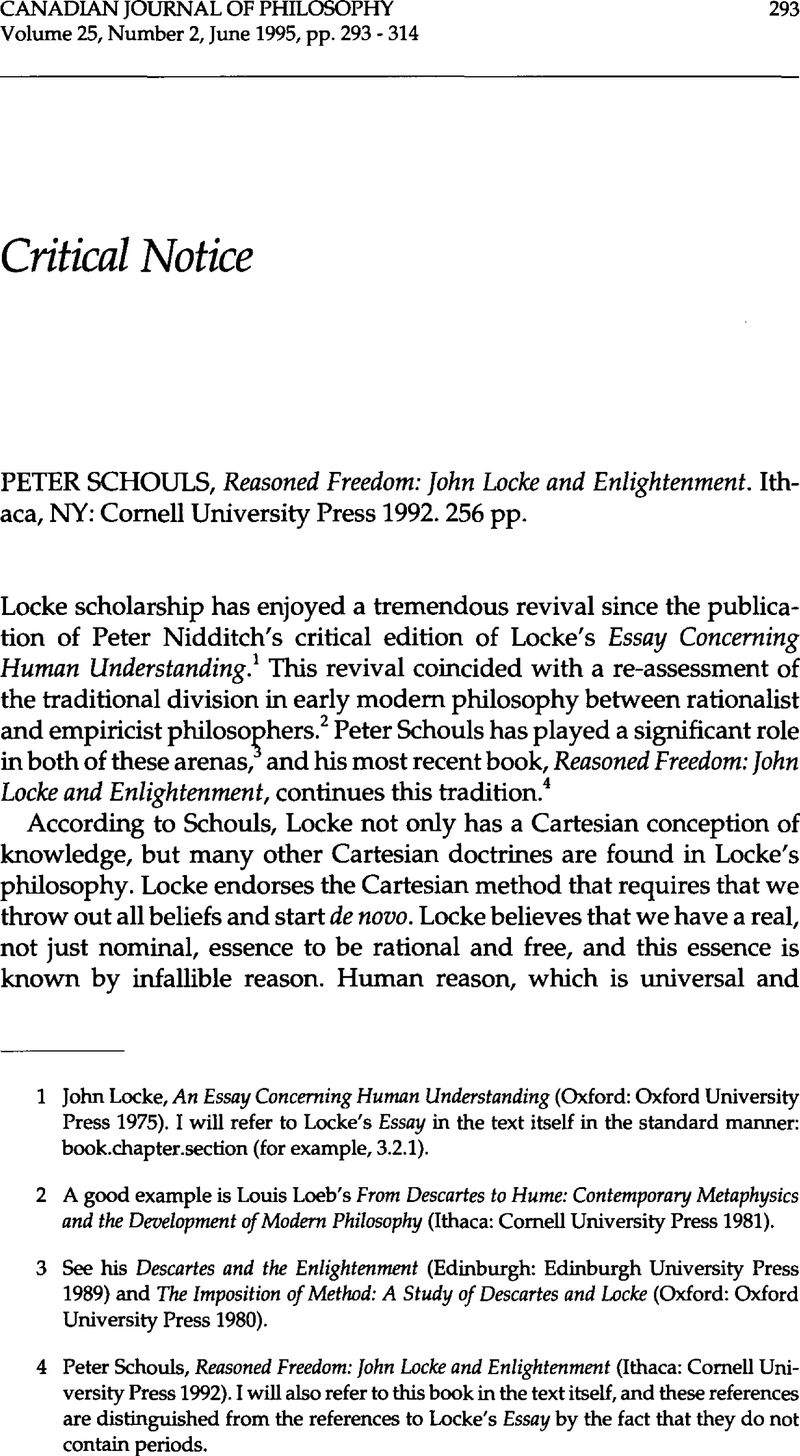Published online by Cambridge University Press: 01 January 2020

1 Locke, John An Essay Concerning Human Understanding (Oxford: Oxford University Press 1975).Google Scholar I will refer to Locke's Essay in the text itself in the standard manner: book.chapter.section (for example, 3.2.1).
2 A good example is Loeb's, Louis From Descartes to Hume: Contemporary Metaphysics and the Development of Modern Philosophy (Ithaca: Cornell University Press 1981).Google Scholar
3 See his Descartes and the Enlightenment (Edinburgh: Edinburgh University Press 1989) and The Imposition of Method: A Study of Descartes and Locke (Oxford: Oxford University Press 1980).
4 Schouls, Peter Reasoned Freedom: John Locke and Enlightenment (Ithaca: Cornell University Press 1992).CrossRefGoogle Scholar I will also refer to this book in the text itself, and these references are distinguished from the references to Locke's Essay by the fact that they do not contain periods.
5 For Locke even the idea of whiteness is an abstract idea (2.11.9).
6 I checked this using the electronic text of Locke's Essay in the Oxford Electronic Text Library (1990). I relied on this text while writing this essay, and highly recommend electronic texts for getting a new perspective on familiar texts.
7 In other places, Locke plays up the importance of language to reasoning. For example, he writes that ‘most Men, if not all, in their Thinking and Reasonings within themselves, make use of Words instead of Ideas; at least when the subject of their Meditation contains in it complex Ideas’ (4.5.4). Locke writes that general truths are ‘very seldom apprehended, but as conceived and expressed in Words’ (4.6.2). We need to rely on language because our ideas, as we have seen, are themselves unstable, especially when they are complex, and this is not our fault.
8 Oddly enough, Schouls also maintains later in his book that for Locke memory is 'necessary’ or ‘intrinsic’ to reasoning (86 and 88). However, he maintains this only when it serves to support his claim that Locke cannot know infallibly that he is reasoning.
9 In 4.17.15 Locke deviates from this usage, and appears to identify a demonstration with a proof: he writes there that ‘the Agreement of [ideas) is a demonstration.’ He should have written that the perception of the agreement of ideas is a demonstration, which is consistent with how he usually characterizes demonstrations. Even in this very same section Locke writes that ‘when the Agreement … of the intermediate Idea, on both sides with those which we would compare, is plainly discerned, there it amounts to Demonstration’ (4.17.15).
10 What this means is open to interpretation depending on what Locke believed ideas to be. Nothing here depends on a specific (e.g. a representationalist or realist) reading of Locke's theory of ideas.
11 See Feldman, R. ‘Fallibilism and Knowing That One Knows,’ Philosophical Review 90 (1981) 266–82,CrossRefGoogle Scholar who argues that (i) knowing that p does not entail knowing that one knows that p and (ii) one can have fallible knowledge that one knows that p. Although Feldman does not specifically focus on demonstrative knowledge, his position does not preclude fallible knowledge of knowledge that is had on the basis of deductive arguments.
12 For example, Andrew Wiles's recent proof of Fermat's Last Theorem does not come with a proof that he has a proof. This does not make his claim that he knows demonstratively that an + bn =cn is false for any integer greater than 2 dogmatic.
13 Schouls likes to quote from other philosophers to illustrate his reading of Locke. Sometimes he will do this while paraphrasing Locke without giving an attribution in the body of the text itself. Often I found myself exclaiming ‘Locke really said that!' and concluding that Schouls is right about Locke, only to discover in the footnote that this quotation is from Chisholm or Descartes, not Locke. In one case he describes Locke's views by quoting the phrase ‘raise our Nature to its Highest Degree of Perfection,’ and in a footnote you find out that the fact that Schouls can use this phrase from Descartes's proposed title for the Discourse on Method to describe Locke's philosophy shows there is a close affinity between Descartes and Locke (163).
14 Dennett, Daniel C. Elbowroom (Cambridge, MA: MIT Press 1984)Google Scholar
15 Chisholm, Roderick ‘Freedom and Action,’ in Lehrer, K. ed., Freedom and Determinism (New York: Random House 1966), 23Google Scholar
16 Madden, Edward ‘Stewart's Enrichment of the Commonsense Tradition,’ History of Philosophy Quarterly 3 (1986) 45–63Google Scholar
17 Aristotle, Metaphysics 2nd ed., Taylor, Richard ed. (Englewood Cliffs: Prentice Hall 1974)Google Scholar
18 Schouls defends the view that for Locke examined and unexamined desires are always different desires (123 and 143-4). For example, suppose I desire to play the violin right now, but I suspend my action in order to examine this desire, and after due consideration I decide to play because satisfying my desire to play the violin will indeed contribute to my greater happiness. Schouls claims that for Locke my later desire to play the violin is a different desire. Schouls is motivated to make this distinction by his assumption that for Locke actions that are determined by reason are outside nature (145 and 164). I find no evidence for this distinction in the text, and it seems to me inconsistent with Locke's claims that desires that are satisfied in the future are, at the time of satisfaction, no different than desires satisfied now at the present moment (2.21.63-4).
19 In the 2nd and 3rd edition this read ‘though we could’ instead of ‘Could we.’
20 Although Schouls uses the definite article ‘the’ when writing about ultimate good (145 and 153), a search of Locke's Essay shows that Locke does not. Locke writes about ‘our greatest good’ (2.21.51), ‘their greatest good’ (2.21.52), or ‘their summum bonum’ (4.12.11).It is clear from the context, I believe, that Locke is not writing about the greatest good for all human beings, but our individual greatest goods.